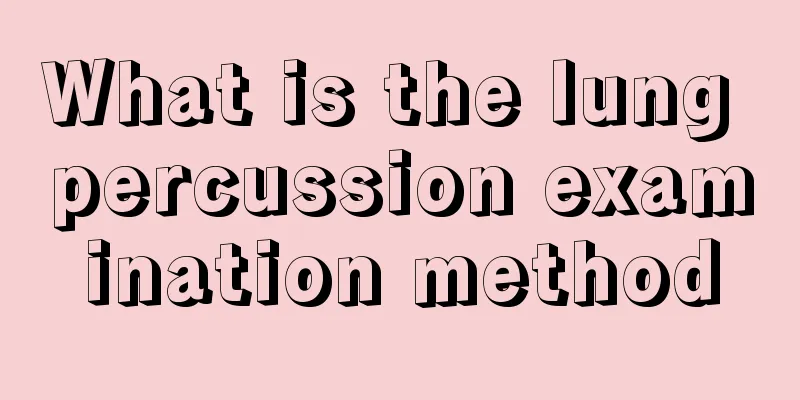Dizziness and nosebleed are caused by

|
There are many reasons for dizziness, such as lack of sleep and excessive fatigue, etc. Of course, these are just some of the milder causes. Many diseases, such as lesions in the nervous system and extreme anemia, can easily cause dizziness. The cause of nosebleed may be due to taking too many supplements, or it may be caused by reasons such as getting angry. Causes of dizziness: 1. Nervous system diseases Such as cerebral ischemic lesions, cerebellar lesions, brain lesions, brain trauma, certain types of epilepsy, etc. In addition, patients with autonomic dysfunction and certain neuroses also often feel dizzy. 2. Ear diseases For example, ear diseases may affect balance and cause dizziness. 3. Internal medicine diseases Such as hypertension, hypotension, various cardiovascular and cerebrovascular diseases, anemia, infection, poisoning, hypoglycemia, etc. 4. Cold Sometimes a cold may cause dizziness. 5. Cervical vertebrae degeneration The main cause of dizziness is the growth, deformation, and degeneration of the cervical vertebrae caused by long-term poor posture or sleeping position, tightening of the neck muscles, and obstruction of arterial blood supply, resulting in insufficient blood supply to the brain. The patient often experiences tightness in the neck, limited flexibility, occasional pain, numbness and coldness of the scalp and fingers, shoulder pain, a feeling of heaviness, and even nausea and palpitations. 6. Anemia If dizziness is accompanied by fatigue and pale complexion, the possibility of anemia should be considered. Patients with indigestion, peptic ulcer, gastrointestinal bleeding and chronic inflammatory diseases may all develop anemia. 7. High blood viscosity Hyperlipidemia, thrombocythemia and other conditions can increase blood viscosity and slow blood flow, resulting in insufficient blood supply to the brain, and easily leading to symptoms such as fatigue, dizziness, and weakness. Currently, the incidence of this type of disease is on the rise. 8. Cerebral arteriosclerosis The patient feels dizzy and often suffers from insomnia, tinnitus, emotional instability, forgetfulness, and numbness in the limbs. Cerebral arteriosclerosis reduces the inner diameter of cerebral blood vessels, reduces blood flow in the brain, causes insufficient blood and oxygen supply to the brain, and causes dizziness. The clinical characteristics are three major symptoms: dizziness, sleep disorders, and memory loss, as well as occipital headache, mild paresis, speech disorders, and irritability. The disease generally develops slowly. The characteristic of this type of dizziness is that it is easy to occur or worsen when the body position changes. 9. Heart disease, coronary heart disease In the early stages of the disease, symptoms are still mild. Some people may not experience obvious discomfort such as chest tightness, palpitations, shortness of breath, etc. They may only feel headache, dizziness, weakness in the limbs, difficulty concentrating, tinnitus, or forgetfulness. Heart diseases such as cardiac arrest, paroxysmal tachycardia, paroxysmal atrial fibrillation, ventricular fibrillation, etc. can lead to acute cerebral ischemia, with symptoms such as dizziness, blurred vision, stomach discomfort, and syncope. 10. Drug poisoning Poisoning by streptomycin, neomycin, kanamycin, gentamicin, etc. is the most common. In addition to dizziness, patients also suffer from vertigo and sensorineural hearing loss caused by cochlear nerve damage. Chronic lead poisoning often manifests as neurasthenia syndrome, with dizziness, headache, insomnia, forgetfulness, fatigue, and nightmares as the main symptoms, as well as hypothermia and loss of appetite. 11. Functional hypoglycemia It can also cause dizziness, palpitations, weakness, tremors when on an empty stomach or when exerting force, sometimes convulsions, loss of consciousness, etc. When you are emotionally stressed or hyperventilating, respiratory alkali poisoning may occur due to increased carbon dioxide excretion, brain cell hypoxia, causing dizziness and fatigue. The patient may also feel numbness and coldness in the face, hands and feet, and occasionally a sense of trance. 12. Vascular inhibition dizziness It is often triggered by emotional tension, pain, fear, bleeding, hot weather, fatigue, cavity, insomnia, etc. Patients often experience autonomic nervous system dysfunction such as dizziness, vertigo, nausea, upper abdominal discomfort, pale complexion, cold sweats, etc. At that time, blood pressure dropped and pulse was weak. Vasoinhibitory dizziness is more common in frail young women. Orthostatic hypotension refers to symptoms such as dizziness, blurred vision, weak legs, vertigo, and even fainting when standing, often accompanied by anorexia and urinary and bowel disorders. Causes of Nosebleed: The tiny blood vessels in the nasal mucosa are densely distributed, very sensitive and fragile, and can easily rupture and cause bleeding. Nosebleeds are common in preschool children. When a person has a nosebleed, most people are accustomed to tilting their head back with their nostrils pointing upwards, thinking that this can effectively stop the bleeding. This is actually wrong. Doing so will only prevent the blood from flowing out, but the blood will actually continue to flow - flowing inwards. The "leaning back posture" during nosebleed has the following disadvantages: 1. The blood that has already flowed out of the nasal cavity will flow backwards to the throat due to the posture and gravity, and it will not have a real hemostatic effect. 2. The blood in the throat will be swallowed into the esophagus and gastrointestinal tract, irritating the gastrointestinal mucosa and causing discomfort or vomiting. 3. When the amount of bleeding is large, it is easy for the blood to be inhaled into the trachea and lungs, blocking the respiratory airflow and causing danger. The correct way is to keep the head upright or slightly tilted forward to allow the blood to flow out of the nostrils to avoid staying in the nasal cavity and interfering with the breathing airflow. The most common location for nosebleeds in children (about 90% or more) is on the nasal septum mucosa about one or two centimeters inside the nostril. Because it is close to the anterior nostril, the most convenient local compression method can be used to stop the bleeding when the nose bleeds. The method is: 1. Adults should first try their best to calm themselves down and not panic, so as to comfort children who are frightened by bleeding. 2. The head should be kept in a normal upright or slightly forward posture. 3. Use your fingers to press the front part of the nose (the soft part of the nose) on the bleeding side from the outside of the nose, similar to pinching the nose with your hands, and apply direct pressure for about five to ten minutes. Most patients can simply stop bleeding in this way. The other nostril that was not bleeding could still breathe freely. 4. If the bleeding does not stop after more than ten minutes of compression, it may mean severe bleeding or other problems. At this time, you need to go to the doctor for further treatment. 5. The purpose of "ice compress on forehead" is to hope that when the forehead skin is exposed to cold, the blood vessels in the nose will contract to stop bleeding, but the effect is not good because it is too far away from the bleeding nostrils, and the local area is too cold and will cause discomfort in the head. Therefore, the correct way is to apply ice directly to the "root of the nose" and "tip of the nose" (that is, the entire nose). Traditional Chinese medicine believes that nosebleeds are caused by the upward flow of qi and blood. The nose belongs to the orifice of the lungs. Generally speaking, any nasal disease is closely related to abnormalities in the lungs, liver and other parts of the body. When a person's Qi and blood rise, especially when the lung Qi is hot, the person will have a nosebleed. When the lung qi is overheated, blood or bleeding may occur in the fundus of the eyes. The causes of getting angry and nosebleed are the same, both are the result of the upward flow of Qi and blood, but getting angry is not the cause of nosebleed. When the nasal cavity is too dry, the capillaries inside will rupture and cause bleeding. From a clinical perspective, 90% of nosebleeds are vascular bleeding caused by blood vessel rupture. In this regard, patients do not need to be too nervous. In most cases, they can handle it themselves and stop the bleeding in time. When your nose is bleeding, you can plug your nose with a tampon and tilt your head back to stop the bleeding as soon as possible. At the same time, you can also apply a cool towel to your forehead or nose to lower the temperature of your head and nose to relieve bleeding symptoms. If there is excessive bleeding in the nasal cavity and it is difficult to stop, you should see a doctor immediately. Nosebleeds in young people are also related to fatigue, exercise, etc. Especially young people who love sports often have their noses suddenly bleed while exercising. Generally speaking, patients can stop bleeding on their own. However, if you have a sudden nosebleed without any warning, it is best to go to the hospital for a check-up to rule out lesions such as nasal tumors as soon as possible. |
<<: What causes acne on the face?
>>: What are the methods to eliminate facial swelling
Recommend
How to treat tibial artery flexion
Generally speaking, patients with varicose veins ...
How are pituitary tumors classified? What are the types of pituitary tumors?
Pituitary tumor is a disease that occurs more oft...
Can canned yellow peaches be frozen
Canned yellow peaches can be frozen, and sealed c...
What will be the consequences if forehead inflammation is not treated?
Frontal sinusitis is a very common disease, and i...
What are the treatments for advanced cancer? 4 common treatments for advanced cancer
What are the treatments for advanced cancer? When...
Dietary taboos for patients with liver cancer
Dietary taboos for liver cancer patients: The anc...
What should I do if I have a headache after staying up late?
Nowadays, work pressure is high and many people h...
Can I still get pregnant after two induced abortions?
Not only abortion can cause permanent damage to a...
What is the glaucoma problem
Some people may not understand the problem of gla...
What to do if you are allergic to lipstick
Lipstick allergy, also known as lipstick disease,...
What facial cleanser is better for removing blackheads
If you want to remove blackheads, it is very impo...
What are the causes of gastric cancer
The cause of gastric cancer has always been a con...
Where is the Hegu blood position
When it comes to the Hegu acupoint, you may not k...
How to preserve purslane for a long time
Purslane is a relatively common wild vegetable. I...
What are the specific causes of lung cancer? Several common factors that lead to lung cancer
The cause of lung cancer is something we must und...









